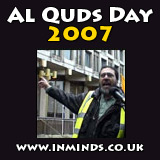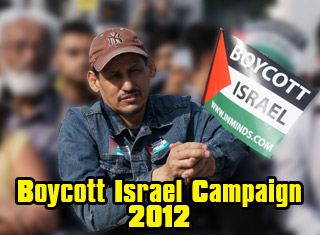
 Innovative Minds © 2014. All Rights Reserved. www.inminds.co.uk | |||||||||||
|
Comment: Article from an Israeli leftist magazine shows how the Oslo Agreement saved the Israeli textile industry by opening up the whole arab labour market for israeli exploitation. Israel uses cheap labor in Jordan and Egypt for sewing, paying less that a tenth of what even an arab in Israel would be paid ($3/day), and then transports the goods back to Israel for exporting to the EU. In this way all the profits go to Israel, and the arab states just become sweatshops with their poverty-stricken economies dependent on Israel. And with economic dependence follows political obedience. Marks and Spencer and Delta Galil are major players in this exploitation. Marks & Spencer Calls the Shots: Israeli Textile Firms Flourish in Jordan and EgyptWehbe Badarneh, Challenge Magazine (March 2000) Following is an article by WAC/Nazareth organizer Wehbe Badarneh on the globalization of Israeli Textile industry and the fate of Arab workers in Israel and Jordan as a result. The article appeared in the Israeli leftist publication Challenge Magazine in March 2000. In the 1970's and 80's, Arab villages in Israel provided the owners of textile plants with a cheap workforce, consisting mostly of young unmarried women. Lately they have ceased to be useful. The Oslo Accords have opened the way to even cheaper labor. Thousands of Arab women in Galilee are now unemployed, while the owners are making fortunes in the new Middle East.
The Oslo Accords contributed the term normalization to the political lexicon. When Israel seeks normalization with Arab lands, however, that does not mean it is looking for a historical reconciliation. The term is rather a code word, signifying the consent of the Arab regimes to Israel's penetration of their unorganized and poverty-stricken economies, so that it may benefit not only from their economic dependence, but from their political obedience as well.
During the years 1996-97, one sewing workshop after another in Galilee shut down. The owners claimed they could not compete with cheap East Asian goods. For a moment it looked as though Israel, one of the world's most developed textile producers, was about to kiss the industry goodbye. Not so. According to the Manufacturers' Association of Israel (MAI), the big textile producersâwith Delta of Galilee at their headâhave doubled their profits in the last few years and are expected to do even better. In an interview with Challenge on February 17, Zvi Lieberman, spokesperson for MAI's textile sector, cited a 10% growth in exports last year. He also confirmed the decline in jobs: an industry that at its height employed 45,000 now provides work for 38,000. What accounts for this combination of growth and unemployment? Go to Irbid, Young Man!Until this year, three Israeli firms sold textiles to the British chain, Marks and Spencer (M&S). They were Solog, Delta-Galil and Polgat. In late 1999, M&S informed Solog that its products were too expensive; starting in the year 2000 it would cease to buy them. Since Solog sold half of its products to M &S, the decision was a mortal blow.[1] Delta-Galil also makes half its sales to M &S; they amounted to $180 million last year. In contrast with Solog, however, M&S intends to increase its purchases from Delta by 20%. As for Polgat, it sells two-thirds of its product to the British chain for an annual return of $108 million. Here too M&S will continue to buy. What then makes Delta and Polgat so different from Solog? Geography. Solog has remained entirely in Israel. Delta and Polgat have relocated their labor-intensive sections to Jordan and Egypt. In this light we may understand why so many of the Arab women in Galilee are jobless. Until 1996 there were 400 textile sweatshops in the Arab areas, all linked to Israeli firms either directly or as subcontractors. Then came a wave of shutdowns. The timing is not accidental. The peace treaty with Jordan was signed in October 1994. Many textile firms then opened branches at Jordan's industrial zone in the city of Irbid. In 1995-96, Delta closed many of its local plants, including workshops in Shfa'amr and Kfar Tavor employing 200 persons each. Its main plant in Carmiel has survived as the center of operations, but it has dispersed much of the work throughout the Middle East. According to Yoram Gabizon (Ha'aretz, Feb. 16), production in cheap labor locations amounted to 36% of Deltaâs overall output in 1999, compared to 24.6% in 1998. In Jordan, Delta entered into partnership with a firm called al-Bahari. It could not produce enough there, however, so it invested $5 million in Egypt, opening a branch with 1600 workers. It is to be noted that at $3 per day, Egyptian wages are highly competitive. Polgat, for its part, has a plant in Jordan employing 700 and another in Egypt with 400. Next year Polgat is planning to open an additional textile factory in Egypt, as well as one in Portugal. Other firms have done likewise. All told, Israelis have thirty plants in Jordan to date, mostly in textiles, employing 6000 workers. Among the Israeli companies there are Argeman, Kitan (which closed its factory in Nazareth two years ago), Rim Textiles (which closed in Kfar Kana), Rotex, Sabrina, Tango, Pazman (a producer of diamonds) and Kaniel (a producer of jars). (See Ma'ariv, Dec. 20, 1999.) Delta manager Arnon Teeberg explained, two years ago, the cold-blooded calculations that guide him: Textile production is based on labor power. Investment in salaries is a major component ... While it costs us $1000 monthly to employ a worker from Galilee, a worker from Irbid in Jordan costs only $100. (Yediot Aharonot, Feb. 17, 1998.) Zvi Lieberman of MAI confirmed to Challenge that there has been a structural change in Israel's textile industry, especially in the last two years. Weaving and dyeing remain in the country, he said, as well as development and marketing. Much sewing, however, has gone abroad, not only to Jordan, but to the PA areas as well. About 7000 Jews and Arabs in Israel have lost their jobs in the process. The joint initiatives between Israeli and Jordanian industrialists remain shrouded in secrecy. The Israeli tycoons are the butts of public criticism because of their responsibility for increasing (Jewish) unemployment. (Few notice the Arab women.) Their Jordanian colleagues are chided on political grounds â many view them as collaborating with Israel. After three years of investment in Jordan, however, it is clear that the textile industry is the only one that has managed to strike root in Arab countries. The reason is simple: it markets its goods to the West (e.g., to Marks and Spencer). Delta is the current success story. It uses cheap labor in Jordan and Egypt for sewing, then transports the goods back to Israel for the final finish. On the other hand, Israeli firms that sought to market in Arab lands have failed. Tamar Weiss has done a Master's thesis on the Irbid industrial zone for the University of Gutenberg in Sweden. She writes: The chairman of the Textile Sector in the Manufacturers Association states that the changes occurring in the textile sector have brought about a massive increase in productivity in the sector, mainly due to absorption and assimilation of new production technologies together with reduction of costs. Dov Lautman, President of Delta-Galil has stated that capital-intense and technological processes will remain in Israel, but that other parts of the production process that can be carried out more efficiently in other countries will be transferred abroad.[2] According to Delta-Galilâs representative, Delta-Galil today employs 3,300 workers in Israel. This number is even bigger than the number of workers Delta-Galil employed before the production transfer to Jordan. The difference between the periods is in the composition of the workers. Today Delta-Galil employs more Israeli employees specializing in marketing, engineering, technology, business-management, economics and international trade. Therefore, according to Delta-Galil one has to look at the overall picture.[3] This overall picture fails to include the fact that jobless Arab workers, especially women, will not become engineers and marketers. For them the Israeli economy has no solution. But what about the new jobs created in Jordan, Egypt and the PA areas? Here the case of Delta-Galil is significant, exemplifying the economic power relations that Israel is seeking to establish throughout the Arab world. There is no long-range vision â no investment in education or social development â but rather the perpetuation of misery. Israel holds both the capital and the technology, reaping huge profits, and it intends to keep things that way. If the Jordanian or Egyptian workers should ever demand higher wages or better working conditions, the Israeli owners will threaten to close and move to a cheaper place, leaving them jobless â just as they left the thousands of Arab women in Galilee. The Oslo Accords contributed the term normalization to the political lexicon. When Israel seeks normalization with Arab lands, however, that does not mean it is looking for a historical reconciliation. The term is rather a code word, signifying the consent of the Arab regimes to Israel's penetration of their unorganized and poverty-stricken economies, so that it may benefit not only from their economic dependence, but from their political obedience as well. The story of the Israeli textile industry serves as a vivid example of what globalization does. We see a huge European retailer working with local moguls to redraft the map of the region, perpetuating the poverty of millions. To change that map to a human scale, the workers in the Middle East will need to join hands in foiling the plans of those who would separate and exploit them. References [1]Ora Koren and Natan Lipson in Ha'aretz, November 30, 1999.) [2]Tamar Weiss here cites E. Alaluf, How Much Does a Person Need to Live? Globes (Hebrew), August 5, 1999. [3]From an interview by Tamar Weiss with Delta-Galil representative, Raz Sapir, in Tel Aviv on August 15, 1999.
For additional articles on globalizing trends in the textile industry, see Challenge # 40, p. 14 and # 48, pp. 12-14. Source: Challenge Magazine: http://www.challenge-mag.com/en/home Related Articles
Also Of InterestPage URL: http://inminds.co.uk/article.php?id=10218
|
|
Support Us
If you agree with our work then please support us.Campaigns INMINDS Facebook Live Feed Latest Video's
INMINDS Twitter Feed Tweets by @InmindsComFeatured Video's
You need Flash player 8+ and JavaScript enabled to view this video.
[all videos (over 200)..] Featured MP3 Podcast  "The only nation which was created out of genocide is this nation [pointing to the US embassy].. was built on the genocide of Red Indians - the whole of their community was wiped out completely. You know they were given blankets with infections to destroy the whole of their community. Then you look and see what they did to the black community. You go and see what they did in Hiroshima and Nagasaki. The country that is talking against nuclear weapons is the only country that has used it against innocent people. This is the murderous embassy of the United States. So if you want to respond to the ayat of Qur'an to stand up against oppression this should be your first candidate.." Islamic Human Rights Commission Al Quds Day 2006, London [4min / 2Mb] [all podcasts..] Newsletter Feedback |
 |
 |



















































